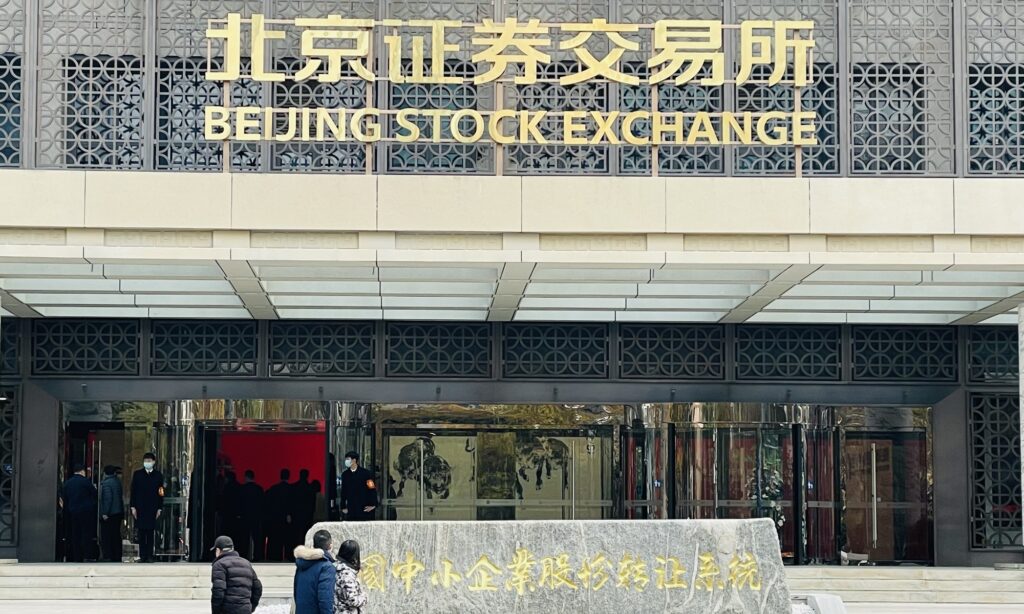China has accelerated reform of its capital market, with market-making trading launched on the Beijing Stock Exchange (BSE) on Monday and the across-the-board registration-based IPO system arrangements was introduced.
Experts said that China’s continuous high-level reform and opening-up will mean new opportunities for other economies and provide more certainty for the world amid global volatilities.
The China Securities Regulatory Commission (CSRC) approved 15 market makers for listed securities, and 13 will participate in trading on the Beijing bourse, the BSE said in a statement on its website.
The move will help reduce investors’ transaction costs while raising market liquidity and stability, according to the BSE.
A more important reform of the capital market — an across-the-board registration-based IPO system — took place on Friday, putting in place the necessary institutional arrangements, the CSRC said in a statement on its website.
“The registration-based IPO system creates a market screening mechanism for survival of the fittest,” Dong Shaopeng, a senior research fellow at the Chongyang Institute for Financial Studies at Renmin University of China, told the Global Times.
He said the new IPO rules will channel capital to high-value companies that have sound operations and strong innovation capability, which will help stabilize employment and support the development of China’s economy.
The widely anticipated registration-based IPO system is a milestone in China’s equities market evolution, Chen Jia, an independent analyst on global strategy, told the Global Times on Monday.
The system will accelerate institutional innovation of China’s financial market, promote connectivity between the domestic and global capital markets, and accelerate expansion of high-value Chinese enterprises overseas and the introduction of foreign enterprises to China, Chen said.
Boosted by the milestone reform as well as the country’s strong economic rebound expectations, major A-share indexes closed higher on Monday. The Shenzhen Component gained 2.03 percent to close at 11,954.13, while the Shanghai Composite rose 2.06 percent to end at 3,290.34.
Goldman Sachs analysts projected on Monday that Chinese stocks will rise as much as 24 percent year-on-year in 2023, as the country moves past the reopening to a growth phase, CNBC reported.
The CSRC set its priorities for the reform and development of the capital market in 2023 in early February. It pledged to push forward the institutional reform of the capital market steadily and strengthen interconnectivity with overseas markets.
Policies related to stocks, bonds, financing, and mergers and acquisitions will be more inclusive and suitable for tech firms, and more measures will be rolled out to serve key areas and weak links such as the private sector, small firms and real estate, it said.
The A-share market rebound, buoyed by a swift economic reopening, has raised overseas investors’ enthusiasm, with multiple international asset managers including Greenwoods Asset Management Hong Kong and Perseverance Asset Management International Singapore having increased their holdings of Chinese stocks.
Meanwhile, foreign investment banks expanded operations in China thanks to the growing attractiveness of yuan assets. In January, Schroder Investment Management (China) became the fifth wholly foreign-owned public fund management firm in China to obtain regulatory approval.
In early February, Standard Chartered Bank (Hong Kong) said that it had obtained approval from the CSRC to set up a securities firm in the Chinese mainland.
Experts said that the new reforms will give an important boost to China’s economic upgrading following the adjustment of COVID-19 measures, which will guarantee high-quality services for the economy.
As China’s optimized COVID-19 measures took effect, there was an obvious rebound in the consumption and services sectors.
Confidence in the household and business sectors has been further strengthened by pro-growth fiscal and monetary policies, Zhou Maohua, an economist at Everbright Bank, told the Global Times on Monday.
For the world, China’s economic reopening is poised to boost global growth, Zhou said. “On one hand, the recovery of consumption will boost imports of goods and services, creating more jobs in overseas economies. On the other hand, the reopening will further facilitate personnel exchange and trading in goods and enhance supply chains’ stability,” he said.
The IMF projected that China’s economy will grow by 5.2 percent in 2023, 0.8 percentage points higher than the forecast issued in October. It forecast that China’s economic growth will hit 4.5 percent in 2024.
China will remain one of the major countries to see the strongest growth this year, and its contribution to global economic growth will stand at 30 percent, Steven Barnett, IMF senior resident representative in China, said recently, the Xinhua News Agency reported.
